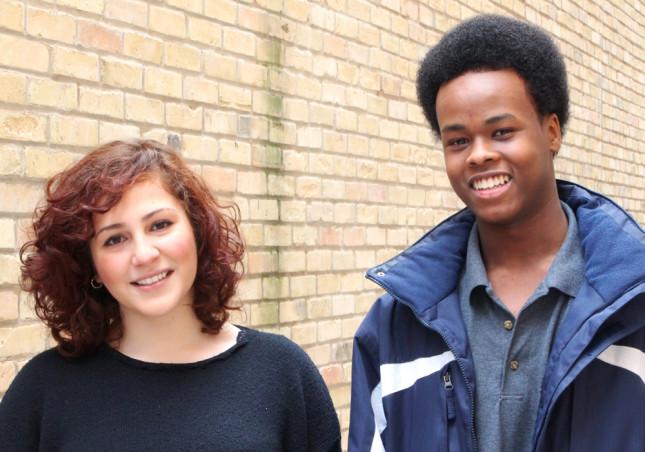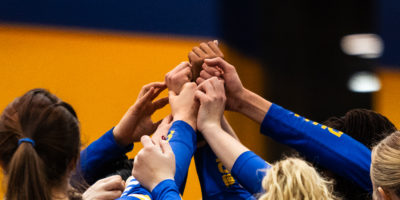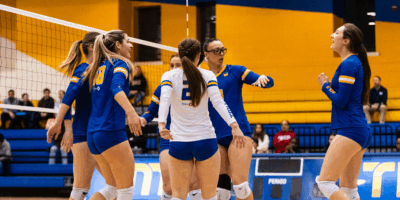By Sean Wetselaar
It’s late in the night on Feb. 13 and the results for the Ryerson Students’ Union elections are finally rolling in. There’s no surprise: it’s a landslide victory for the heavily favoured slate Students United.
As the final tallies confirm victory, current president Rodney Diverlus grabs his successor, Melissa Palermo, in a fierce hug. A handful of supporters applaud and the elected executives rotate around the Ram in the Rye congratulating each other.
It’s the picture of a perfect and predictable election triumph.
The RSU executive has been largely uncontested over the past several years, despite strong competition for faculty director and board positions, leading to what appears to be a one-party system in the union’s top jobs.
To top it off, voter apathy continued to plague elections with a turnout of less than 11 per cent this year. All this has contributed to an apathetic political culture on campus.
“There’s a huge problem with [voter turnout], because it shows that there is massive disinterest in campus politics,” says Ani Dergalstanian, an independent who ran for vicepresident equity against Students United’s Rajean Hoilett. “[But] there’s problems with youth disinterest in politics all over Canada.
The participation in campus politics at Ryerson just reflects the national disinterest.” Though general apathy is a factor, the RSU has been criticized for poor advertising of the elections, which could minimize participation.
This year, an email notifying students of the nomination period was sent two days before it closed. Still, Diverlus insists he made a concerted effort to publicize the event.
“One of the major focuses that we wanted to do this year was make sure that you could literally live under a rock but you knew that there was an election period, that there were nominations,” Diverlus says.
He adds that publicity for the event began before the Christmas break, and that the time of the election does not change from year to year, giving prospective students lots of time to prepare.
But this lack of competition in elections has not always been a factor in campus politics, according to Diverlus.
“As a campus we’re constantly evolving and there’s different trends. When I started here the trend was to have goliath versus goliath versus goliath,” he says. “My first two elections were not fun elections … Some executives were like 200 [votes ahead]. The year before me, an executive won with 30 votes, so that’s the difference.”
From 2007-2009 there was competition between two core slates in each election, with the same oppositional group challenging the existing slate each year. Results in these years were very close.
The shift in competition could be due to a number of factors. Diverlus notes that many slates that have come and gone are based on a core group of students, who disappear from the scene after graduation. Some students eligible to run will also base their decisions on workload. Diverlus says work on the executive is “a sacrifice.” After five years at Ryerson, he has spent so much time with the RSU – executives often work 60-80 hour work weeks – that he still has a year and a half of school before graduation.
Regardless of the reason for a shift in participation, Students’ United has enjoyed several years of largely uncontested control over the executive. And, though many decisions made are ultimately up to the board, Diverlus agrees the executive maintains a large amount of clout.
Ryerson President Sheldon Levy says it is difficult to force students to participate in campus politics, meaning there are bound to be years where participation is lower.
“I do think it’s always good in a democratic process to have strong opposition, but if the students don’t feel that way, that they have better things to do or are less interested in student politics, then you have what you have,” he says. “I worked well with all the student governments, so it doesn’t mean a negative as far as I can see at the university.” Nelson Wiseman, an associate professor in the department of politcal science at the University of Toronto, notes that involvement in campus politics could inherently be linked to the slate currently in power.
“Some people are, by nature, political animals. So they will vote in any election no matter what the question is,” Wiseman says. “They want to get involved in student politics, so the easiest way to do that is to sidle up to the parties that are in power now, rather than to try to build a completely alternative machine.
“When I was in Cuba, a number of years ago, I thought to myself, ‘Well, look, if I lived here I would join the Communist Party right away,’ because it was the only way to get ahead in any way.”
Despite a growth of individual campaigning in recent years, Dergalstanian thinks that after running as an independent in the RSU elections, and now with a team in the senate elections, the backing of a slate is hugely beneficial to a campaign.
“I have a few people in mind that I’ve spoken to that I hope to join forces with and create an oppositional slate,” she says. “Because the fact remains that slates are a lot more powerful, a lot more advantageous to winning an election.”
Roble Mohamed, who lost to Palermo by 311 votes in a bid for RSU presidency, hopes he’ll be a stronger candidate as part of a slate in future elections.
“I’m going to run again next year for sure,” he says. “And I need a team next time. I’ll have a team of like 5-10 people.” Though next year’s elections may be more contested, Diverlus notes it is not the responsibility of the RSU to field competition for future years.
“The responsibility is on the individual,” Diverlus says. “My role [in last year’s election] was to make myself the best candidate I could be and to have experience and that I had my stuff together. My role wasn’t to make sure my opposition had their stuff together.”
Whether the system changes due to random fluctuations, or due to changing ideas on campus, it seems to be that apathy and involvment is an issue that cannot be simply resolved.
“It’s a systemic problem that we need to address within our generation,” Diverlus says. “And I don’t know what the answer is.”












frank
Wow, never saw that coming. Just like I didn’t see at least one unsealed ballot box being used during the elections, just like I didn’t see one candidate yaking it up with the poll clerks during the stations open times. Nope, nothing unusual here. Just like there there no conflict of interest between the CRO and her non-connection to this university and its student union. psst, wanna buy some cheap water front property in Florida? How about a nice historic bridge in New York City?